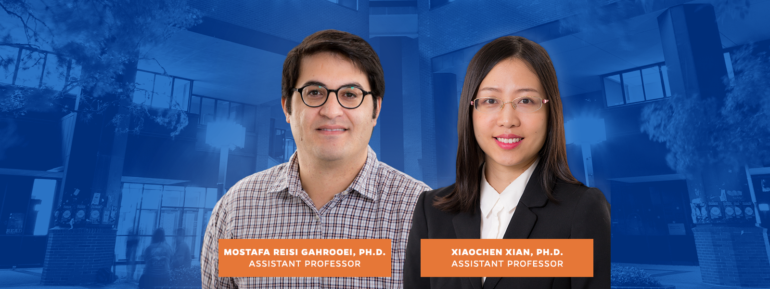Two data analytics faculty members in the Department of Industrial & Systems Engineering (ISE) at the University of Florida have received awards from the UF Informatics Institute (UFII) in support of research projects, two of which focus on predicting socioeconomic impacts of COVID-19.
Mostafa Reisi Gahrooei, Ph.D., an assistant professor, received two separate awards from UFII. The first funded project will support Reisi and Panos Pardalos, Ph.D., the Paul and Heidi Brown Endowed Professor in ISE, as well as Ioannis Ampatzidis, Ph.D., assistant professor of Agricultural and Biological Engineering, in research to create artificial intelligence-based predictive models of specific crop yields for the agricultural industry.
The team plans to use small unmanned aerial vehicles with multiple sensors to collect data over vast crop fields. Once the data has been collected, they will develop multimodal-data fusion-based AI models that will leverage different datasets to accurately predict crop yields as well as early-stage onset of disease. This work will ultimately assist growers in crop health management and yield improvements.
The UFII has also funded Reisi and Christa Court, Ph.D., assistant professor of Food and Resource Economics, to conduct research in predicting economic changes in the State of Florida as a result of natural and man-made disaster events, such as hurricanes, harmful algal blooms, as well as COVID-19.
The team, which also includes Joao Pedro Ferreira, Ph.D., a post-doctoral associate in Food and Resource Economics, are working to develop a proof-of-concept framework for predicting changes in employment and income based on data-driven models of daily consumer product sales (including best, average, and worst scenarios).
The main objective of this study is to develop data-driven approaches for extracting spatial and temporal patterns of demand changes, based on historic Nielsen product sales data. Although the available database is limited to data through 2018, the assessment of previous disasters, such as Hurricane Irma and the Deepwater Horizon oil spill, will provide a “proof-of-concept” for applying such methods to assess the COVID-19 pandemic. The capability to more accurately predict near-term changes in demand for specific classes of products will allow for subsequent estimation of employment and income changes at sectoral levels and across different income groups due to demand changes.
Xiaochen Xian, Ph.D., an assistant professor in UF ISE has also received funding from the UFII for her research in predicting the socioeconomic impacts of COVID-19.
Xian, who is a Co-PI on the project, is working with Yujie Hu, Ph.D., an assistant professor in the UF Department of Geography. Together, the researchers are working to use data-driven methods to understand economic impacts of the pandemic, specifically impacts on crime rates. The team will be looking at how the pandemic will affect a region’s crime rate in the short term, and how it will affect crime statistics in the long term.
The models from this research are expected to improve prediction of crime patterns amidst the COVID-19 pandemic. This type of information may allow law enforcement agencies to form a more appropriate response and adopt appropriate resource allocation for more effective crime prevention policies.
This story originally appeared on UF ISE.
Check out more stories on the UF A.I. Initiative.

